Organisational Behaviour in Tesco: Culture, Politics and Motivation
VerifiedAdded on 2023/06/07
|15
|4784
|324
Report
AI Summary
This report provides a detailed analysis of organisational behaviour within Tesco, examining the influence of organisational culture, politics, and power on individual and team performance. It evaluates content and process theories of motivation, including Maslow's hierarchy of needs and Vroom's expectancy theory, and discusses various motivational techniques employed by Tesco. The report also differentiates between effective and ineffective teams and explores group development theory to foster cooperation. Furthermore, it delves into the concepts and philosophies of organisational behaviour, providing a comprehensive overview of how these elements impact Tesco's overall effectiveness and goal achievement. The analysis emphasizes Tesco's efforts to create a positive work environment, promote teamwork, and empower employees, ultimately contributing to increased efficiency and revenue generation.
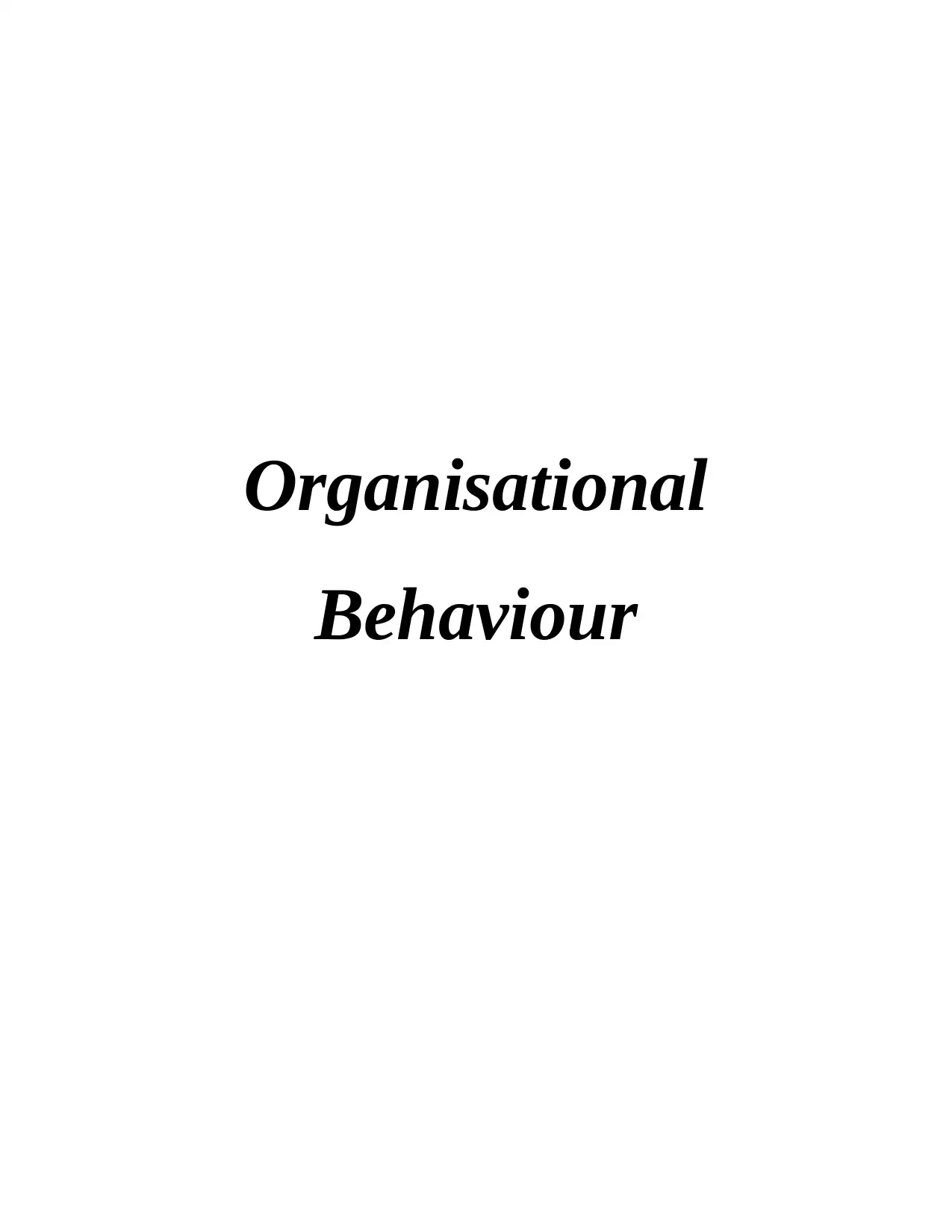
Organisational
Behaviour
Behaviour
Paraphrase This Document
Need a fresh take? Get an instant paraphrase of this document with our AI Paraphraser
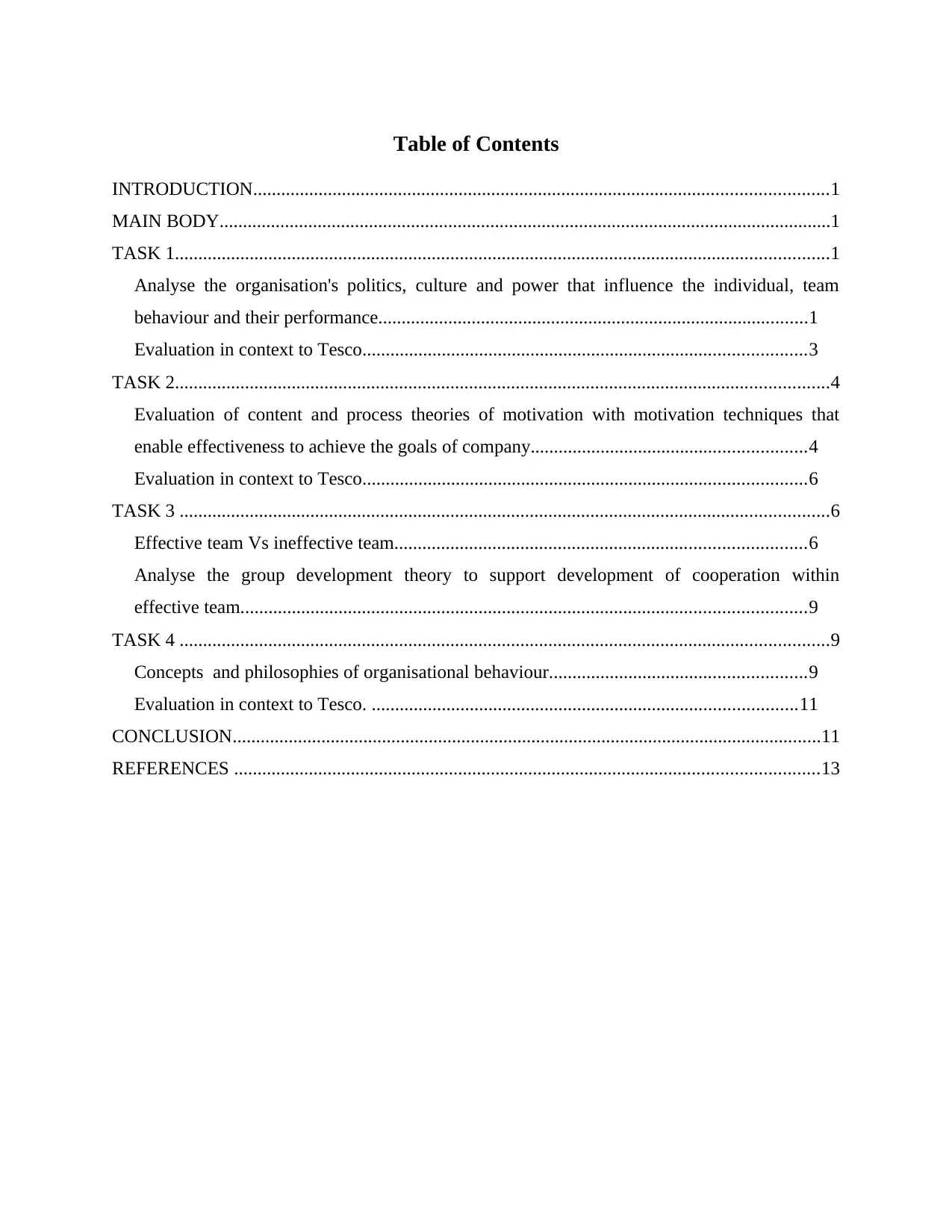
Table of Contents
INTRODUCTION...........................................................................................................................1
MAIN BODY...................................................................................................................................1
TASK 1............................................................................................................................................1
Analyse the organisation's politics, culture and power that influence the individual, team
behaviour and their performance............................................................................................1
Evaluation in context to Tesco...............................................................................................3
TASK 2............................................................................................................................................4
Evaluation of content and process theories of motivation with motivation techniques that
enable effectiveness to achieve the goals of company...........................................................4
Evaluation in context to Tesco...............................................................................................6
TASK 3 ...........................................................................................................................................6
Effective team Vs ineffective team........................................................................................6
Analyse the group development theory to support development of cooperation within
effective team.........................................................................................................................9
TASK 4 ...........................................................................................................................................9
Concepts and philosophies of organisational behaviour.......................................................9
Evaluation in context to Tesco. ...........................................................................................11
CONCLUSION..............................................................................................................................11
REFERENCES .............................................................................................................................13
INTRODUCTION...........................................................................................................................1
MAIN BODY...................................................................................................................................1
TASK 1............................................................................................................................................1
Analyse the organisation's politics, culture and power that influence the individual, team
behaviour and their performance............................................................................................1
Evaluation in context to Tesco...............................................................................................3
TASK 2............................................................................................................................................4
Evaluation of content and process theories of motivation with motivation techniques that
enable effectiveness to achieve the goals of company...........................................................4
Evaluation in context to Tesco...............................................................................................6
TASK 3 ...........................................................................................................................................6
Effective team Vs ineffective team........................................................................................6
Analyse the group development theory to support development of cooperation within
effective team.........................................................................................................................9
TASK 4 ...........................................................................................................................................9
Concepts and philosophies of organisational behaviour.......................................................9
Evaluation in context to Tesco. ...........................................................................................11
CONCLUSION..............................................................................................................................11
REFERENCES .............................................................................................................................13
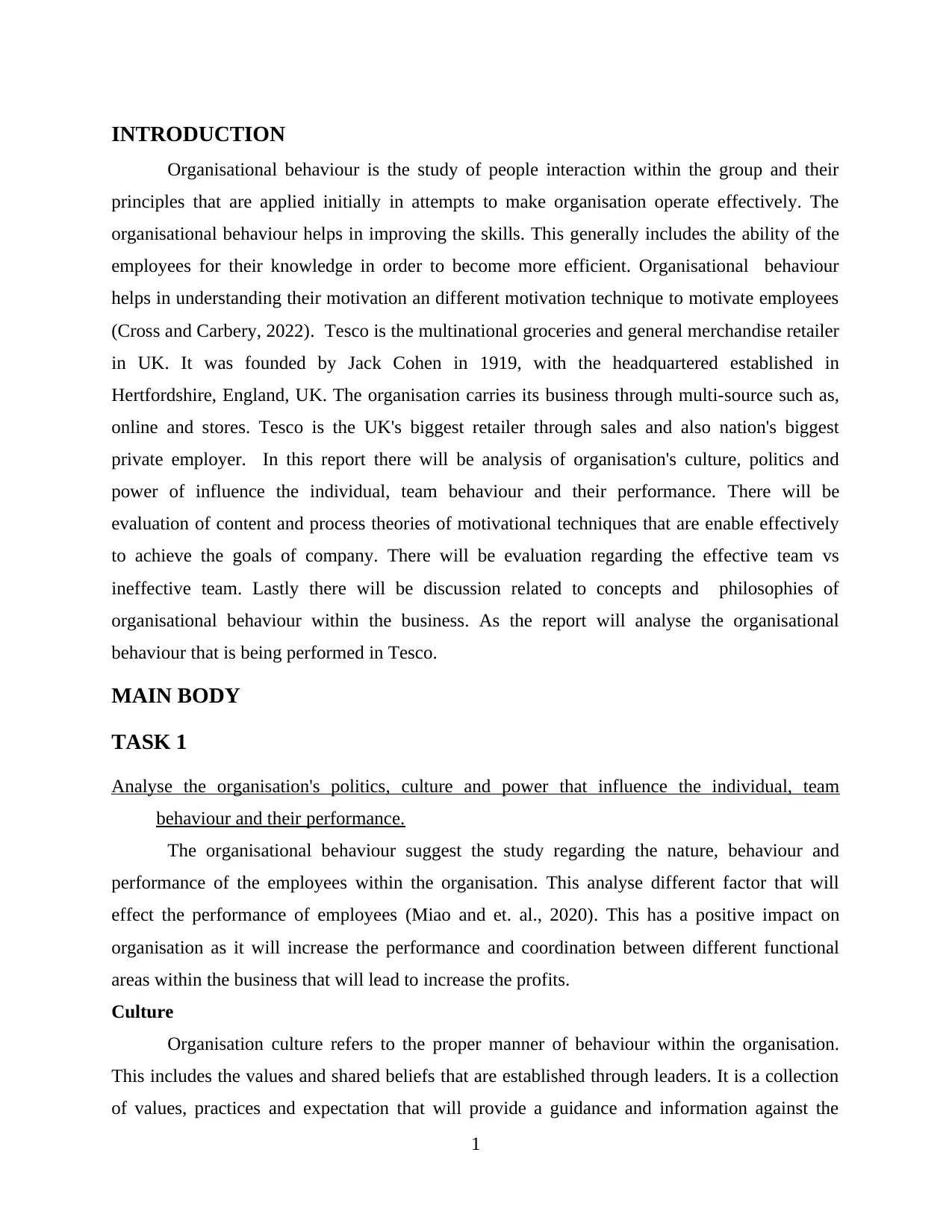
INTRODUCTION
Organisational behaviour is the study of people interaction within the group and their
principles that are applied initially in attempts to make organisation operate effectively. The
organisational behaviour helps in improving the skills. This generally includes the ability of the
employees for their knowledge in order to become more efficient. Organisational behaviour
helps in understanding their motivation an different motivation technique to motivate employees
(Cross and Carbery, 2022). Tesco is the multinational groceries and general merchandise retailer
in UK. It was founded by Jack Cohen in 1919, with the headquartered established in
Hertfordshire, England, UK. The organisation carries its business through multi-source such as,
online and stores. Tesco is the UK's biggest retailer through sales and also nation's biggest
private employer. In this report there will be analysis of organisation's culture, politics and
power of influence the individual, team behaviour and their performance. There will be
evaluation of content and process theories of motivational techniques that are enable effectively
to achieve the goals of company. There will be evaluation regarding the effective team vs
ineffective team. Lastly there will be discussion related to concepts and philosophies of
organisational behaviour within the business. As the report will analyse the organisational
behaviour that is being performed in Tesco.
MAIN BODY
TASK 1
Analyse the organisation's politics, culture and power that influence the individual, team
behaviour and their performance.
The organisational behaviour suggest the study regarding the nature, behaviour and
performance of the employees within the organisation. This analyse different factor that will
effect the performance of employees (Miao and et. al., 2020). This has a positive impact on
organisation as it will increase the performance and coordination between different functional
areas within the business that will lead to increase the profits.
Culture
Organisation culture refers to the proper manner of behaviour within the organisation.
This includes the values and shared beliefs that are established through leaders. It is a collection
of values, practices and expectation that will provide a guidance and information against the
1
Organisational behaviour is the study of people interaction within the group and their
principles that are applied initially in attempts to make organisation operate effectively. The
organisational behaviour helps in improving the skills. This generally includes the ability of the
employees for their knowledge in order to become more efficient. Organisational behaviour
helps in understanding their motivation an different motivation technique to motivate employees
(Cross and Carbery, 2022). Tesco is the multinational groceries and general merchandise retailer
in UK. It was founded by Jack Cohen in 1919, with the headquartered established in
Hertfordshire, England, UK. The organisation carries its business through multi-source such as,
online and stores. Tesco is the UK's biggest retailer through sales and also nation's biggest
private employer. In this report there will be analysis of organisation's culture, politics and
power of influence the individual, team behaviour and their performance. There will be
evaluation of content and process theories of motivational techniques that are enable effectively
to achieve the goals of company. There will be evaluation regarding the effective team vs
ineffective team. Lastly there will be discussion related to concepts and philosophies of
organisational behaviour within the business. As the report will analyse the organisational
behaviour that is being performed in Tesco.
MAIN BODY
TASK 1
Analyse the organisation's politics, culture and power that influence the individual, team
behaviour and their performance.
The organisational behaviour suggest the study regarding the nature, behaviour and
performance of the employees within the organisation. This analyse different factor that will
effect the performance of employees (Miao and et. al., 2020). This has a positive impact on
organisation as it will increase the performance and coordination between different functional
areas within the business that will lead to increase the profits.
Culture
Organisation culture refers to the proper manner of behaviour within the organisation.
This includes the values and shared beliefs that are established through leaders. It is a collection
of values, practices and expectation that will provide a guidance and information against the
1
⊘ This is a preview!⊘
Do you want full access?
Subscribe today to unlock all pages.

Trusted by 1+ million students worldwide
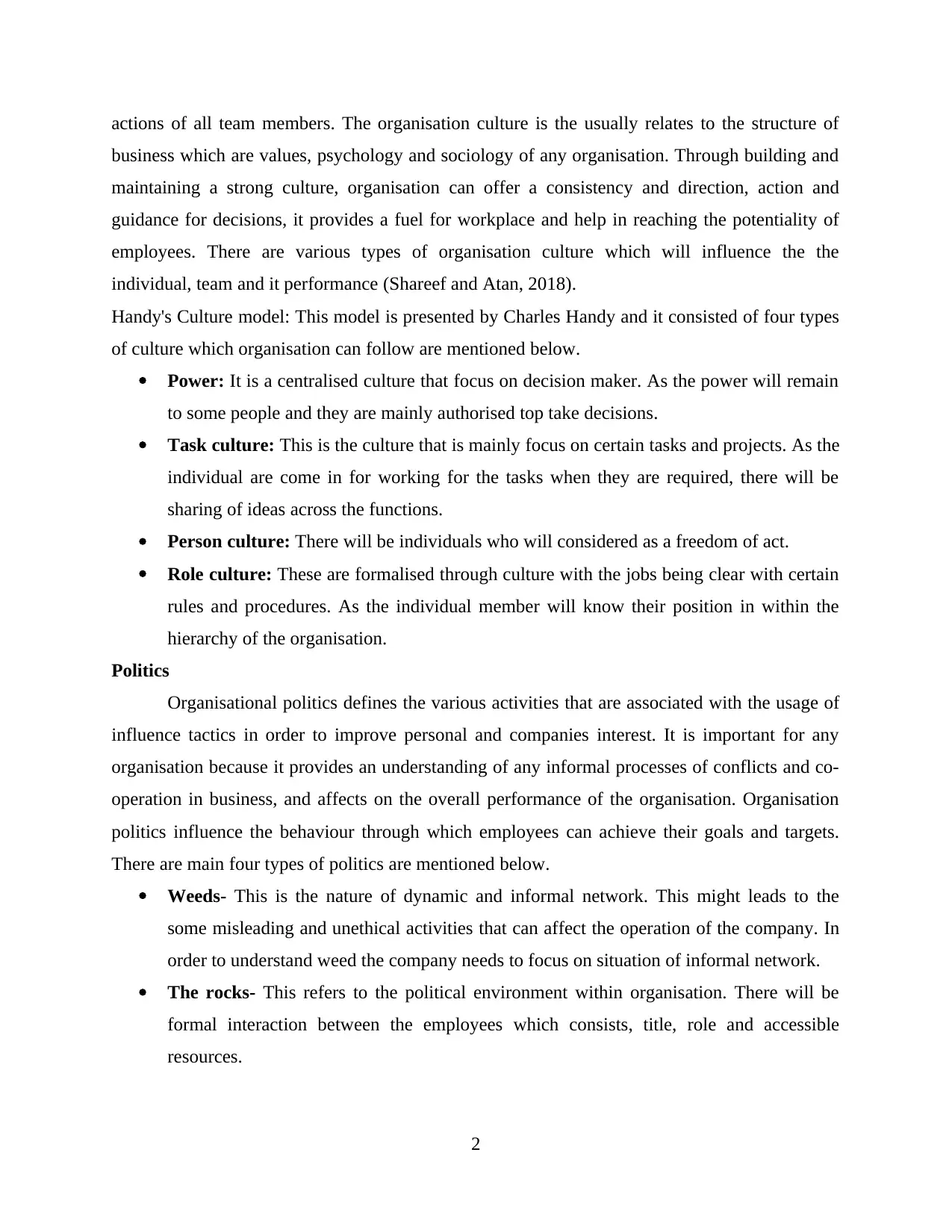
actions of all team members. The organisation culture is the usually relates to the structure of
business which are values, psychology and sociology of any organisation. Through building and
maintaining a strong culture, organisation can offer a consistency and direction, action and
guidance for decisions, it provides a fuel for workplace and help in reaching the potentiality of
employees. There are various types of organisation culture which will influence the the
individual, team and it performance (Shareef and Atan, 2018).
Handy's Culture model: This model is presented by Charles Handy and it consisted of four types
of culture which organisation can follow are mentioned below.
Power: It is a centralised culture that focus on decision maker. As the power will remain
to some people and they are mainly authorised top take decisions.
Task culture: This is the culture that is mainly focus on certain tasks and projects. As the
individual are come in for working for the tasks when they are required, there will be
sharing of ideas across the functions.
Person culture: There will be individuals who will considered as a freedom of act.
Role culture: These are formalised through culture with the jobs being clear with certain
rules and procedures. As the individual member will know their position in within the
hierarchy of the organisation.
Politics
Organisational politics defines the various activities that are associated with the usage of
influence tactics in order to improve personal and companies interest. It is important for any
organisation because it provides an understanding of any informal processes of conflicts and co-
operation in business, and affects on the overall performance of the organisation. Organisation
politics influence the behaviour through which employees can achieve their goals and targets.
There are main four types of politics are mentioned below.
Weeds- This is the nature of dynamic and informal network. This might leads to the
some misleading and unethical activities that can affect the operation of the company. In
order to understand weed the company needs to focus on situation of informal network.
The rocks- This refers to the political environment within organisation. There will be
formal interaction between the employees which consists, title, role and accessible
resources.
2
business which are values, psychology and sociology of any organisation. Through building and
maintaining a strong culture, organisation can offer a consistency and direction, action and
guidance for decisions, it provides a fuel for workplace and help in reaching the potentiality of
employees. There are various types of organisation culture which will influence the the
individual, team and it performance (Shareef and Atan, 2018).
Handy's Culture model: This model is presented by Charles Handy and it consisted of four types
of culture which organisation can follow are mentioned below.
Power: It is a centralised culture that focus on decision maker. As the power will remain
to some people and they are mainly authorised top take decisions.
Task culture: This is the culture that is mainly focus on certain tasks and projects. As the
individual are come in for working for the tasks when they are required, there will be
sharing of ideas across the functions.
Person culture: There will be individuals who will considered as a freedom of act.
Role culture: These are formalised through culture with the jobs being clear with certain
rules and procedures. As the individual member will know their position in within the
hierarchy of the organisation.
Politics
Organisational politics defines the various activities that are associated with the usage of
influence tactics in order to improve personal and companies interest. It is important for any
organisation because it provides an understanding of any informal processes of conflicts and co-
operation in business, and affects on the overall performance of the organisation. Organisation
politics influence the behaviour through which employees can achieve their goals and targets.
There are main four types of politics are mentioned below.
Weeds- This is the nature of dynamic and informal network. This might leads to the
some misleading and unethical activities that can affect the operation of the company. In
order to understand weed the company needs to focus on situation of informal network.
The rocks- This refers to the political environment within organisation. There will be
formal interaction between the employees which consists, title, role and accessible
resources.
2
Paraphrase This Document
Need a fresh take? Get an instant paraphrase of this document with our AI Paraphraser
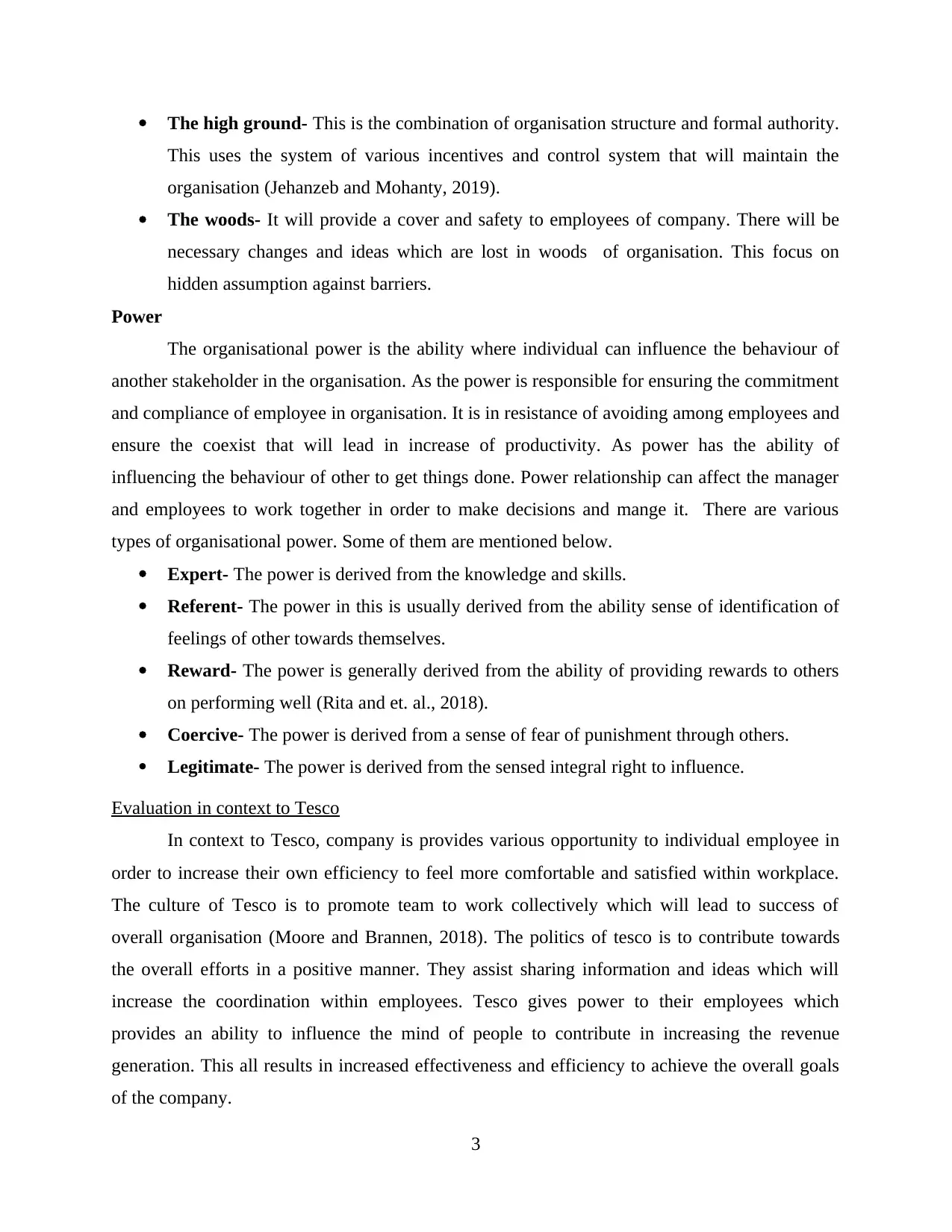
The high ground- This is the combination of organisation structure and formal authority.
This uses the system of various incentives and control system that will maintain the
organisation (Jehanzeb and Mohanty, 2019).
The woods- It will provide a cover and safety to employees of company. There will be
necessary changes and ideas which are lost in woods of organisation. This focus on
hidden assumption against barriers.
Power
The organisational power is the ability where individual can influence the behaviour of
another stakeholder in the organisation. As the power is responsible for ensuring the commitment
and compliance of employee in organisation. It is in resistance of avoiding among employees and
ensure the coexist that will lead in increase of productivity. As power has the ability of
influencing the behaviour of other to get things done. Power relationship can affect the manager
and employees to work together in order to make decisions and mange it. There are various
types of organisational power. Some of them are mentioned below.
Expert- The power is derived from the knowledge and skills.
Referent- The power in this is usually derived from the ability sense of identification of
feelings of other towards themselves.
Reward- The power is generally derived from the ability of providing rewards to others
on performing well (Rita and et. al., 2018).
Coercive- The power is derived from a sense of fear of punishment through others.
Legitimate- The power is derived from the sensed integral right to influence.
Evaluation in context to Tesco
In context to Tesco, company is provides various opportunity to individual employee in
order to increase their own efficiency to feel more comfortable and satisfied within workplace.
The culture of Tesco is to promote team to work collectively which will lead to success of
overall organisation (Moore and Brannen, 2018). The politics of tesco is to contribute towards
the overall efforts in a positive manner. They assist sharing information and ideas which will
increase the coordination within employees. Tesco gives power to their employees which
provides an ability to influence the mind of people to contribute in increasing the revenue
generation. This all results in increased effectiveness and efficiency to achieve the overall goals
of the company.
3
This uses the system of various incentives and control system that will maintain the
organisation (Jehanzeb and Mohanty, 2019).
The woods- It will provide a cover and safety to employees of company. There will be
necessary changes and ideas which are lost in woods of organisation. This focus on
hidden assumption against barriers.
Power
The organisational power is the ability where individual can influence the behaviour of
another stakeholder in the organisation. As the power is responsible for ensuring the commitment
and compliance of employee in organisation. It is in resistance of avoiding among employees and
ensure the coexist that will lead in increase of productivity. As power has the ability of
influencing the behaviour of other to get things done. Power relationship can affect the manager
and employees to work together in order to make decisions and mange it. There are various
types of organisational power. Some of them are mentioned below.
Expert- The power is derived from the knowledge and skills.
Referent- The power in this is usually derived from the ability sense of identification of
feelings of other towards themselves.
Reward- The power is generally derived from the ability of providing rewards to others
on performing well (Rita and et. al., 2018).
Coercive- The power is derived from a sense of fear of punishment through others.
Legitimate- The power is derived from the sensed integral right to influence.
Evaluation in context to Tesco
In context to Tesco, company is provides various opportunity to individual employee in
order to increase their own efficiency to feel more comfortable and satisfied within workplace.
The culture of Tesco is to promote team to work collectively which will lead to success of
overall organisation (Moore and Brannen, 2018). The politics of tesco is to contribute towards
the overall efforts in a positive manner. They assist sharing information and ideas which will
increase the coordination within employees. Tesco gives power to their employees which
provides an ability to influence the mind of people to contribute in increasing the revenue
generation. This all results in increased effectiveness and efficiency to achieve the overall goals
of the company.
3
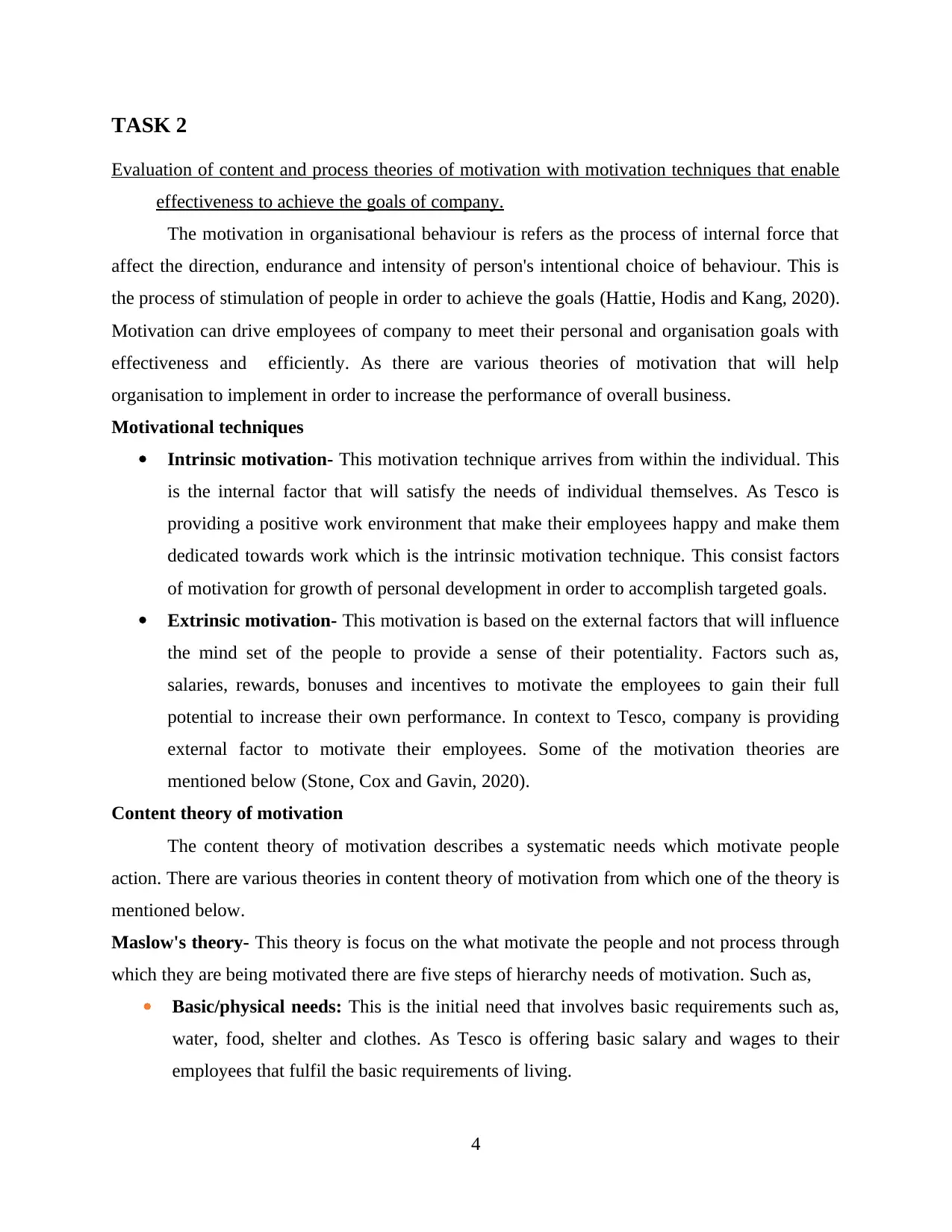
TASK 2
Evaluation of content and process theories of motivation with motivation techniques that enable
effectiveness to achieve the goals of company.
The motivation in organisational behaviour is refers as the process of internal force that
affect the direction, endurance and intensity of person's intentional choice of behaviour. This is
the process of stimulation of people in order to achieve the goals (Hattie, Hodis and Kang, 2020).
Motivation can drive employees of company to meet their personal and organisation goals with
effectiveness and efficiently. As there are various theories of motivation that will help
organisation to implement in order to increase the performance of overall business.
Motivational techniques
Intrinsic motivation- This motivation technique arrives from within the individual. This
is the internal factor that will satisfy the needs of individual themselves. As Tesco is
providing a positive work environment that make their employees happy and make them
dedicated towards work which is the intrinsic motivation technique. This consist factors
of motivation for growth of personal development in order to accomplish targeted goals.
Extrinsic motivation- This motivation is based on the external factors that will influence
the mind set of the people to provide a sense of their potentiality. Factors such as,
salaries, rewards, bonuses and incentives to motivate the employees to gain their full
potential to increase their own performance. In context to Tesco, company is providing
external factor to motivate their employees. Some of the motivation theories are
mentioned below (Stone, Cox and Gavin, 2020).
Content theory of motivation
The content theory of motivation describes a systematic needs which motivate people
action. There are various theories in content theory of motivation from which one of the theory is
mentioned below.
Maslow's theory- This theory is focus on the what motivate the people and not process through
which they are being motivated there are five steps of hierarchy needs of motivation. Such as,
Basic/physical needs: This is the initial need that involves basic requirements such as,
water, food, shelter and clothes. As Tesco is offering basic salary and wages to their
employees that fulfil the basic requirements of living.
4
Evaluation of content and process theories of motivation with motivation techniques that enable
effectiveness to achieve the goals of company.
The motivation in organisational behaviour is refers as the process of internal force that
affect the direction, endurance and intensity of person's intentional choice of behaviour. This is
the process of stimulation of people in order to achieve the goals (Hattie, Hodis and Kang, 2020).
Motivation can drive employees of company to meet their personal and organisation goals with
effectiveness and efficiently. As there are various theories of motivation that will help
organisation to implement in order to increase the performance of overall business.
Motivational techniques
Intrinsic motivation- This motivation technique arrives from within the individual. This
is the internal factor that will satisfy the needs of individual themselves. As Tesco is
providing a positive work environment that make their employees happy and make them
dedicated towards work which is the intrinsic motivation technique. This consist factors
of motivation for growth of personal development in order to accomplish targeted goals.
Extrinsic motivation- This motivation is based on the external factors that will influence
the mind set of the people to provide a sense of their potentiality. Factors such as,
salaries, rewards, bonuses and incentives to motivate the employees to gain their full
potential to increase their own performance. In context to Tesco, company is providing
external factor to motivate their employees. Some of the motivation theories are
mentioned below (Stone, Cox and Gavin, 2020).
Content theory of motivation
The content theory of motivation describes a systematic needs which motivate people
action. There are various theories in content theory of motivation from which one of the theory is
mentioned below.
Maslow's theory- This theory is focus on the what motivate the people and not process through
which they are being motivated there are five steps of hierarchy needs of motivation. Such as,
Basic/physical needs: This is the initial need that involves basic requirements such as,
water, food, shelter and clothes. As Tesco is offering basic salary and wages to their
employees that fulfil the basic requirements of living.
4
⊘ This is a preview!⊘
Do you want full access?
Subscribe today to unlock all pages.

Trusted by 1+ million students worldwide
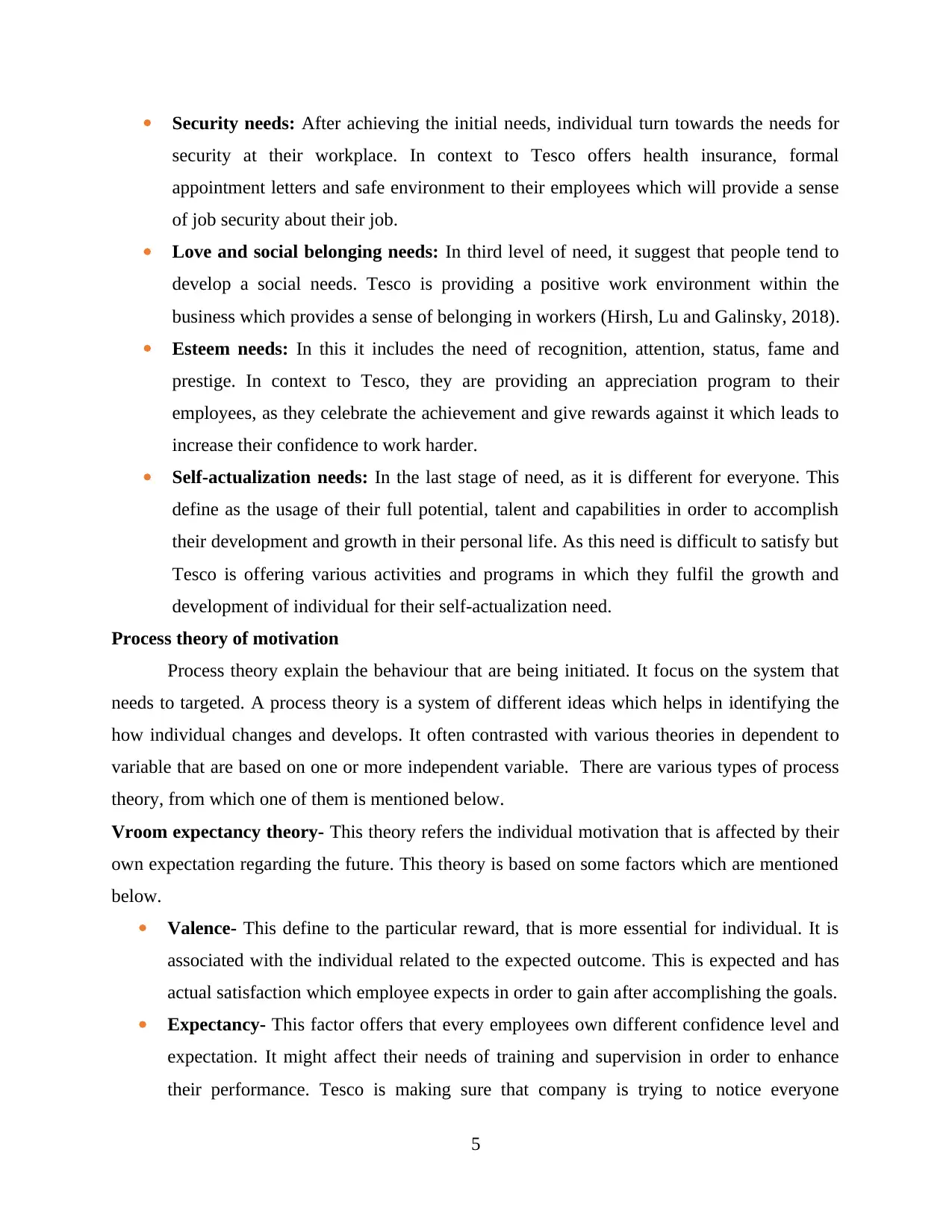
Security needs: After achieving the initial needs, individual turn towards the needs for
security at their workplace. In context to Tesco offers health insurance, formal
appointment letters and safe environment to their employees which will provide a sense
of job security about their job.
Love and social belonging needs: In third level of need, it suggest that people tend to
develop a social needs. Tesco is providing a positive work environment within the
business which provides a sense of belonging in workers (Hirsh, Lu and Galinsky, 2018).
Esteem needs: In this it includes the need of recognition, attention, status, fame and
prestige. In context to Tesco, they are providing an appreciation program to their
employees, as they celebrate the achievement and give rewards against it which leads to
increase their confidence to work harder.
Self-actualization needs: In the last stage of need, as it is different for everyone. This
define as the usage of their full potential, talent and capabilities in order to accomplish
their development and growth in their personal life. As this need is difficult to satisfy but
Tesco is offering various activities and programs in which they fulfil the growth and
development of individual for their self-actualization need.
Process theory of motivation
Process theory explain the behaviour that are being initiated. It focus on the system that
needs to targeted. A process theory is a system of different ideas which helps in identifying the
how individual changes and develops. It often contrasted with various theories in dependent to
variable that are based on one or more independent variable. There are various types of process
theory, from which one of them is mentioned below.
Vroom expectancy theory- This theory refers the individual motivation that is affected by their
own expectation regarding the future. This theory is based on some factors which are mentioned
below.
Valence- This define to the particular reward, that is more essential for individual. It is
associated with the individual related to the expected outcome. This is expected and has
actual satisfaction which employee expects in order to gain after accomplishing the goals.
Expectancy- This factor offers that every employees own different confidence level and
expectation. It might affect their needs of training and supervision in order to enhance
their performance. Tesco is making sure that company is trying to notice everyone
5
security at their workplace. In context to Tesco offers health insurance, formal
appointment letters and safe environment to their employees which will provide a sense
of job security about their job.
Love and social belonging needs: In third level of need, it suggest that people tend to
develop a social needs. Tesco is providing a positive work environment within the
business which provides a sense of belonging in workers (Hirsh, Lu and Galinsky, 2018).
Esteem needs: In this it includes the need of recognition, attention, status, fame and
prestige. In context to Tesco, they are providing an appreciation program to their
employees, as they celebrate the achievement and give rewards against it which leads to
increase their confidence to work harder.
Self-actualization needs: In the last stage of need, as it is different for everyone. This
define as the usage of their full potential, talent and capabilities in order to accomplish
their development and growth in their personal life. As this need is difficult to satisfy but
Tesco is offering various activities and programs in which they fulfil the growth and
development of individual for their self-actualization need.
Process theory of motivation
Process theory explain the behaviour that are being initiated. It focus on the system that
needs to targeted. A process theory is a system of different ideas which helps in identifying the
how individual changes and develops. It often contrasted with various theories in dependent to
variable that are based on one or more independent variable. There are various types of process
theory, from which one of them is mentioned below.
Vroom expectancy theory- This theory refers the individual motivation that is affected by their
own expectation regarding the future. This theory is based on some factors which are mentioned
below.
Valence- This define to the particular reward, that is more essential for individual. It is
associated with the individual related to the expected outcome. This is expected and has
actual satisfaction which employee expects in order to gain after accomplishing the goals.
Expectancy- This factor offers that every employees own different confidence level and
expectation. It might affect their needs of training and supervision in order to enhance
their performance. Tesco is making sure that company is trying to notice everyone
5
Paraphrase This Document
Need a fresh take? Get an instant paraphrase of this document with our AI Paraphraser
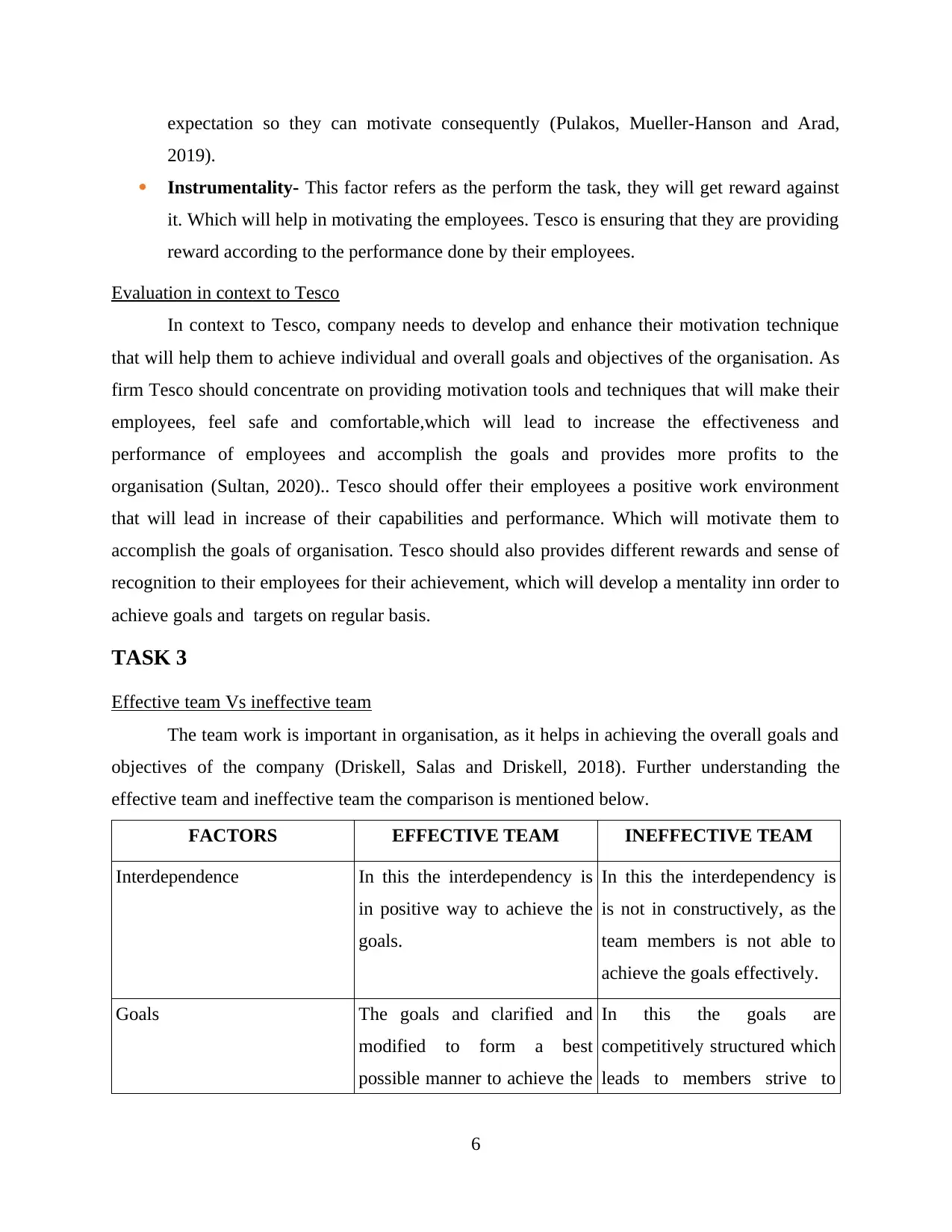
expectation so they can motivate consequently (Pulakos, Mueller-Hanson and Arad,
2019).
Instrumentality- This factor refers as the perform the task, they will get reward against
it. Which will help in motivating the employees. Tesco is ensuring that they are providing
reward according to the performance done by their employees.
Evaluation in context to Tesco
In context to Tesco, company needs to develop and enhance their motivation technique
that will help them to achieve individual and overall goals and objectives of the organisation. As
firm Tesco should concentrate on providing motivation tools and techniques that will make their
employees, feel safe and comfortable,which will lead to increase the effectiveness and
performance of employees and accomplish the goals and provides more profits to the
organisation (Sultan, 2020).. Tesco should offer their employees a positive work environment
that will lead in increase of their capabilities and performance. Which will motivate them to
accomplish the goals of organisation. Tesco should also provides different rewards and sense of
recognition to their employees for their achievement, which will develop a mentality inn order to
achieve goals and targets on regular basis.
TASK 3
Effective team Vs ineffective team
The team work is important in organisation, as it helps in achieving the overall goals and
objectives of the company (Driskell, Salas and Driskell, 2018). Further understanding the
effective team and ineffective team the comparison is mentioned below.
FACTORS EFFECTIVE TEAM INEFFECTIVE TEAM
Interdependence In this the interdependency is
in positive way to achieve the
goals.
In this the interdependency is
is not in constructively, as the
team members is not able to
achieve the goals effectively.
Goals The goals and clarified and
modified to form a best
possible manner to achieve the
In this the goals are
competitively structured which
leads to members strive to
6
2019).
Instrumentality- This factor refers as the perform the task, they will get reward against
it. Which will help in motivating the employees. Tesco is ensuring that they are providing
reward according to the performance done by their employees.
Evaluation in context to Tesco
In context to Tesco, company needs to develop and enhance their motivation technique
that will help them to achieve individual and overall goals and objectives of the organisation. As
firm Tesco should concentrate on providing motivation tools and techniques that will make their
employees, feel safe and comfortable,which will lead to increase the effectiveness and
performance of employees and accomplish the goals and provides more profits to the
organisation (Sultan, 2020).. Tesco should offer their employees a positive work environment
that will lead in increase of their capabilities and performance. Which will motivate them to
accomplish the goals of organisation. Tesco should also provides different rewards and sense of
recognition to their employees for their achievement, which will develop a mentality inn order to
achieve goals and targets on regular basis.
TASK 3
Effective team Vs ineffective team
The team work is important in organisation, as it helps in achieving the overall goals and
objectives of the company (Driskell, Salas and Driskell, 2018). Further understanding the
effective team and ineffective team the comparison is mentioned below.
FACTORS EFFECTIVE TEAM INEFFECTIVE TEAM
Interdependence In this the interdependency is
in positive way to achieve the
goals.
In this the interdependency is
is not in constructively, as the
team members is not able to
achieve the goals effectively.
Goals The goals and clarified and
modified to form a best
possible manner to achieve the
In this the goals are
competitively structured which
leads to members strive to
6
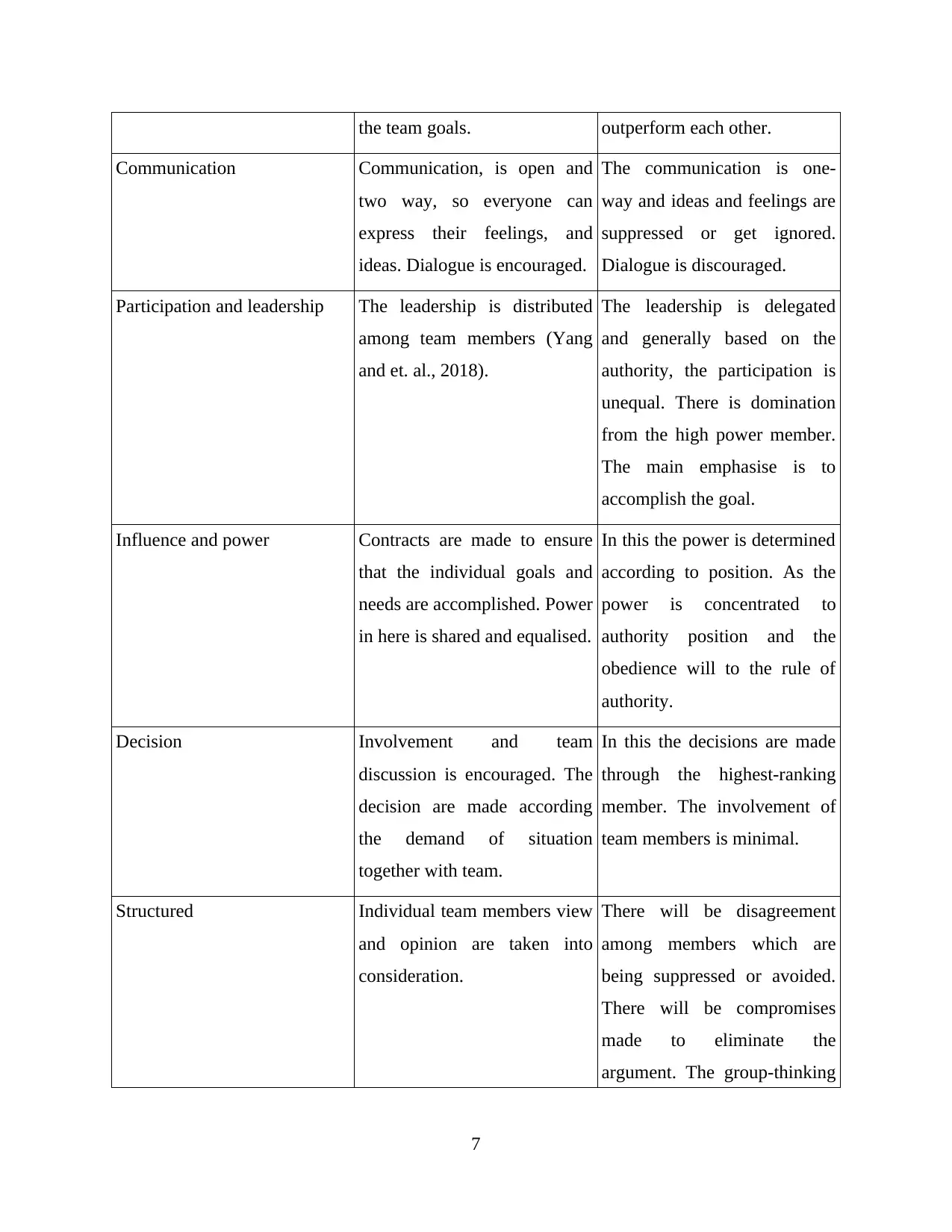
the team goals. outperform each other.
Communication Communication, is open and
two way, so everyone can
express their feelings, and
ideas. Dialogue is encouraged.
The communication is one-
way and ideas and feelings are
suppressed or get ignored.
Dialogue is discouraged.
Participation and leadership The leadership is distributed
among team members (Yang
and et. al., 2018).
The leadership is delegated
and generally based on the
authority, the participation is
unequal. There is domination
from the high power member.
The main emphasise is to
accomplish the goal.
Influence and power Contracts are made to ensure
that the individual goals and
needs are accomplished. Power
in here is shared and equalised.
In this the power is determined
according to position. As the
power is concentrated to
authority position and the
obedience will to the rule of
authority.
Decision Involvement and team
discussion is encouraged. The
decision are made according
the demand of situation
together with team.
In this the decisions are made
through the highest-ranking
member. The involvement of
team members is minimal.
Structured Individual team members view
and opinion are taken into
consideration.
There will be disagreement
among members which are
being suppressed or avoided.
There will be compromises
made to eliminate the
argument. The group-thinking
7
Communication Communication, is open and
two way, so everyone can
express their feelings, and
ideas. Dialogue is encouraged.
The communication is one-
way and ideas and feelings are
suppressed or get ignored.
Dialogue is discouraged.
Participation and leadership The leadership is distributed
among team members (Yang
and et. al., 2018).
The leadership is delegated
and generally based on the
authority, the participation is
unequal. There is domination
from the high power member.
The main emphasise is to
accomplish the goal.
Influence and power Contracts are made to ensure
that the individual goals and
needs are accomplished. Power
in here is shared and equalised.
In this the power is determined
according to position. As the
power is concentrated to
authority position and the
obedience will to the rule of
authority.
Decision Involvement and team
discussion is encouraged. The
decision are made according
the demand of situation
together with team.
In this the decisions are made
through the highest-ranking
member. The involvement of
team members is minimal.
Structured Individual team members view
and opinion are taken into
consideration.
There will be disagreement
among members which are
being suppressed or avoided.
There will be compromises
made to eliminate the
argument. The group-thinking
7
⊘ This is a preview!⊘
Do you want full access?
Subscribe today to unlock all pages.

Trusted by 1+ million students worldwide
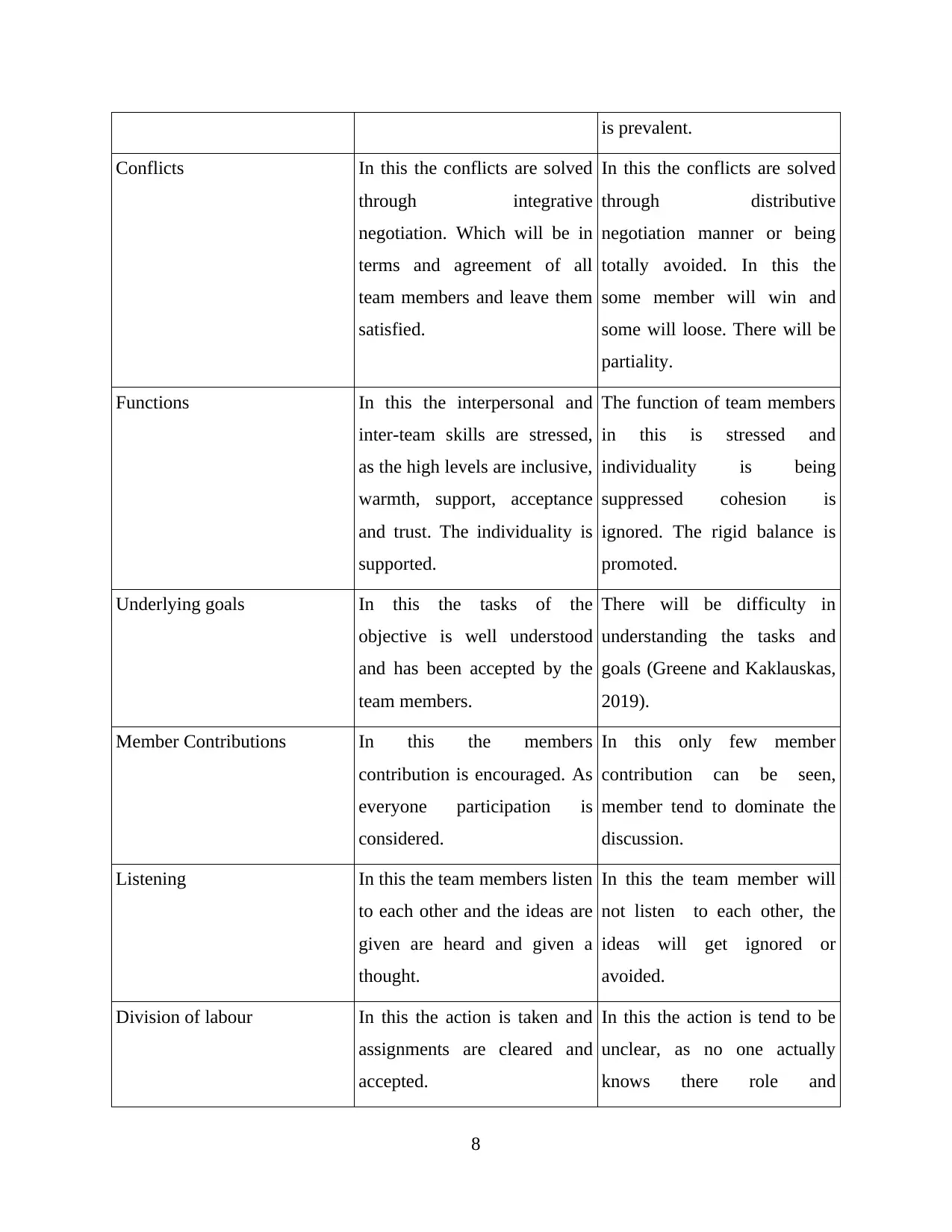
is prevalent.
Conflicts In this the conflicts are solved
through integrative
negotiation. Which will be in
terms and agreement of all
team members and leave them
satisfied.
In this the conflicts are solved
through distributive
negotiation manner or being
totally avoided. In this the
some member will win and
some will loose. There will be
partiality.
Functions In this the interpersonal and
inter-team skills are stressed,
as the high levels are inclusive,
warmth, support, acceptance
and trust. The individuality is
supported.
The function of team members
in this is stressed and
individuality is being
suppressed cohesion is
ignored. The rigid balance is
promoted.
Underlying goals In this the tasks of the
objective is well understood
and has been accepted by the
team members.
There will be difficulty in
understanding the tasks and
goals (Greene and Kaklauskas,
2019).
Member Contributions In this the members
contribution is encouraged. As
everyone participation is
considered.
In this only few member
contribution can be seen,
member tend to dominate the
discussion.
Listening In this the team members listen
to each other and the ideas are
given are heard and given a
thought.
In this the team member will
not listen to each other, the
ideas will get ignored or
avoided.
Division of labour In this the action is taken and
assignments are cleared and
accepted.
In this the action is tend to be
unclear, as no one actually
knows there role and
8
Conflicts In this the conflicts are solved
through integrative
negotiation. Which will be in
terms and agreement of all
team members and leave them
satisfied.
In this the conflicts are solved
through distributive
negotiation manner or being
totally avoided. In this the
some member will win and
some will loose. There will be
partiality.
Functions In this the interpersonal and
inter-team skills are stressed,
as the high levels are inclusive,
warmth, support, acceptance
and trust. The individuality is
supported.
The function of team members
in this is stressed and
individuality is being
suppressed cohesion is
ignored. The rigid balance is
promoted.
Underlying goals In this the tasks of the
objective is well understood
and has been accepted by the
team members.
There will be difficulty in
understanding the tasks and
goals (Greene and Kaklauskas,
2019).
Member Contributions In this the members
contribution is encouraged. As
everyone participation is
considered.
In this only few member
contribution can be seen,
member tend to dominate the
discussion.
Listening In this the team members listen
to each other and the ideas are
given are heard and given a
thought.
In this the team member will
not listen to each other, the
ideas will get ignored or
avoided.
Division of labour In this the action is taken and
assignments are cleared and
accepted.
In this the action is tend to be
unclear, as no one actually
knows there role and
8
Paraphrase This Document
Need a fresh take? Get an instant paraphrase of this document with our AI Paraphraser
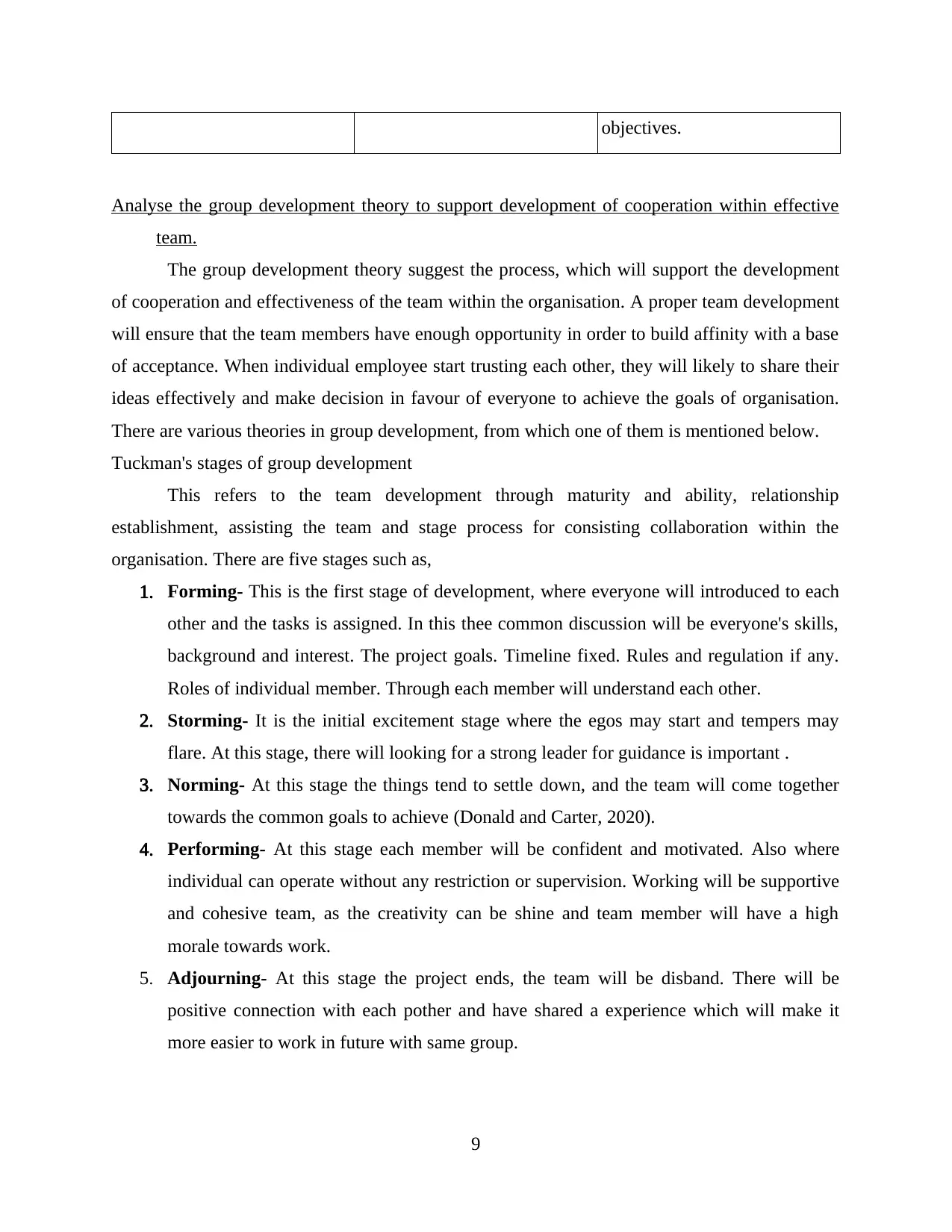
objectives.
Analyse the group development theory to support development of cooperation within effective
team.
The group development theory suggest the process, which will support the development
of cooperation and effectiveness of the team within the organisation. A proper team development
will ensure that the team members have enough opportunity in order to build affinity with a base
of acceptance. When individual employee start trusting each other, they will likely to share their
ideas effectively and make decision in favour of everyone to achieve the goals of organisation.
There are various theories in group development, from which one of them is mentioned below.
Tuckman's stages of group development
This refers to the team development through maturity and ability, relationship
establishment, assisting the team and stage process for consisting collaboration within the
organisation. There are five stages such as,
1. Forming- This is the first stage of development, where everyone will introduced to each
other and the tasks is assigned. In this thee common discussion will be everyone's skills,
background and interest. The project goals. Timeline fixed. Rules and regulation if any.
Roles of individual member. Through each member will understand each other.
2. Storming- It is the initial excitement stage where the egos may start and tempers may
flare. At this stage, there will looking for a strong leader for guidance is important .
3. Norming- At this stage the things tend to settle down, and the team will come together
towards the common goals to achieve (Donald and Carter, 2020).
4. Performing- At this stage each member will be confident and motivated. Also where
individual can operate without any restriction or supervision. Working will be supportive
and cohesive team, as the creativity can be shine and team member will have a high
morale towards work.
5. Adjourning- At this stage the project ends, the team will be disband. There will be
positive connection with each pother and have shared a experience which will make it
more easier to work in future with same group.
9
Analyse the group development theory to support development of cooperation within effective
team.
The group development theory suggest the process, which will support the development
of cooperation and effectiveness of the team within the organisation. A proper team development
will ensure that the team members have enough opportunity in order to build affinity with a base
of acceptance. When individual employee start trusting each other, they will likely to share their
ideas effectively and make decision in favour of everyone to achieve the goals of organisation.
There are various theories in group development, from which one of them is mentioned below.
Tuckman's stages of group development
This refers to the team development through maturity and ability, relationship
establishment, assisting the team and stage process for consisting collaboration within the
organisation. There are five stages such as,
1. Forming- This is the first stage of development, where everyone will introduced to each
other and the tasks is assigned. In this thee common discussion will be everyone's skills,
background and interest. The project goals. Timeline fixed. Rules and regulation if any.
Roles of individual member. Through each member will understand each other.
2. Storming- It is the initial excitement stage where the egos may start and tempers may
flare. At this stage, there will looking for a strong leader for guidance is important .
3. Norming- At this stage the things tend to settle down, and the team will come together
towards the common goals to achieve (Donald and Carter, 2020).
4. Performing- At this stage each member will be confident and motivated. Also where
individual can operate without any restriction or supervision. Working will be supportive
and cohesive team, as the creativity can be shine and team member will have a high
morale towards work.
5. Adjourning- At this stage the project ends, the team will be disband. There will be
positive connection with each pother and have shared a experience which will make it
more easier to work in future with same group.
9
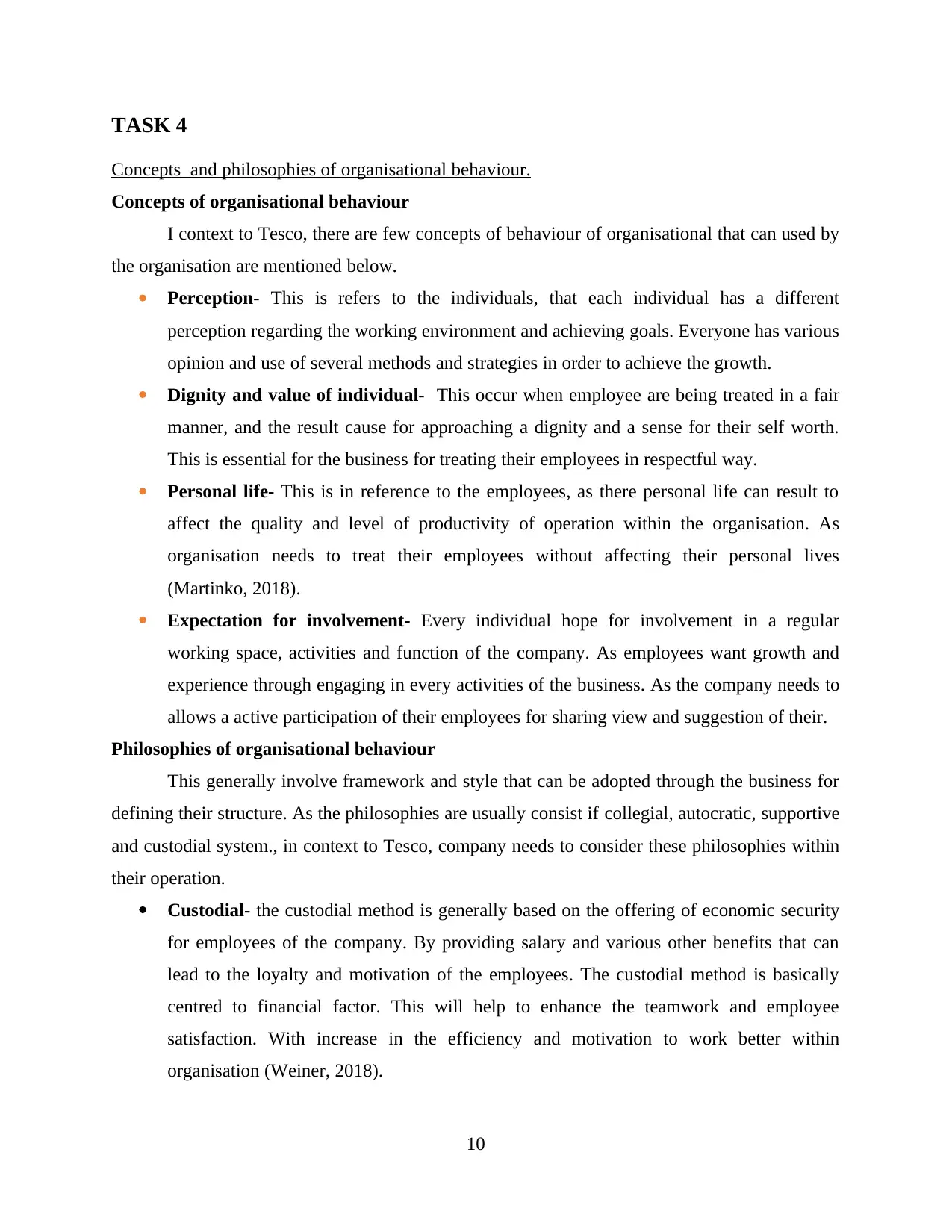
TASK 4
Concepts and philosophies of organisational behaviour.
Concepts of organisational behaviour
I context to Tesco, there are few concepts of behaviour of organisational that can used by
the organisation are mentioned below.
Perception- This is refers to the individuals, that each individual has a different
perception regarding the working environment and achieving goals. Everyone has various
opinion and use of several methods and strategies in order to achieve the growth.
Dignity and value of individual- This occur when employee are being treated in a fair
manner, and the result cause for approaching a dignity and a sense for their self worth.
This is essential for the business for treating their employees in respectful way.
Personal life- This is in reference to the employees, as there personal life can result to
affect the quality and level of productivity of operation within the organisation. As
organisation needs to treat their employees without affecting their personal lives
(Martinko, 2018).
Expectation for involvement- Every individual hope for involvement in a regular
working space, activities and function of the company. As employees want growth and
experience through engaging in every activities of the business. As the company needs to
allows a active participation of their employees for sharing view and suggestion of their.
Philosophies of organisational behaviour
This generally involve framework and style that can be adopted through the business for
defining their structure. As the philosophies are usually consist if collegial, autocratic, supportive
and custodial system., in context to Tesco, company needs to consider these philosophies within
their operation.
Custodial- the custodial method is generally based on the offering of economic security
for employees of the company. By providing salary and various other benefits that can
lead to the loyalty and motivation of the employees. The custodial method is basically
centred to financial factor. This will help to enhance the teamwork and employee
satisfaction. With increase in the efficiency and motivation to work better within
organisation (Weiner, 2018).
10
Concepts and philosophies of organisational behaviour.
Concepts of organisational behaviour
I context to Tesco, there are few concepts of behaviour of organisational that can used by
the organisation are mentioned below.
Perception- This is refers to the individuals, that each individual has a different
perception regarding the working environment and achieving goals. Everyone has various
opinion and use of several methods and strategies in order to achieve the growth.
Dignity and value of individual- This occur when employee are being treated in a fair
manner, and the result cause for approaching a dignity and a sense for their self worth.
This is essential for the business for treating their employees in respectful way.
Personal life- This is in reference to the employees, as there personal life can result to
affect the quality and level of productivity of operation within the organisation. As
organisation needs to treat their employees without affecting their personal lives
(Martinko, 2018).
Expectation for involvement- Every individual hope for involvement in a regular
working space, activities and function of the company. As employees want growth and
experience through engaging in every activities of the business. As the company needs to
allows a active participation of their employees for sharing view and suggestion of their.
Philosophies of organisational behaviour
This generally involve framework and style that can be adopted through the business for
defining their structure. As the philosophies are usually consist if collegial, autocratic, supportive
and custodial system., in context to Tesco, company needs to consider these philosophies within
their operation.
Custodial- the custodial method is generally based on the offering of economic security
for employees of the company. By providing salary and various other benefits that can
lead to the loyalty and motivation of the employees. The custodial method is basically
centred to financial factor. This will help to enhance the teamwork and employee
satisfaction. With increase in the efficiency and motivation to work better within
organisation (Weiner, 2018).
10
⊘ This is a preview!⊘
Do you want full access?
Subscribe today to unlock all pages.

Trusted by 1+ million students worldwide
1 out of 15
Related Documents
Your All-in-One AI-Powered Toolkit for Academic Success.
+13062052269
info@desklib.com
Available 24*7 on WhatsApp / Email
![[object Object]](/_next/static/media/star-bottom.7253800d.svg)
Unlock your academic potential
Copyright © 2020–2025 A2Z Services. All Rights Reserved. Developed and managed by ZUCOL.




